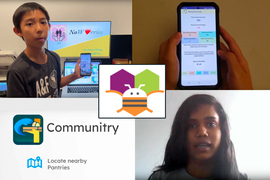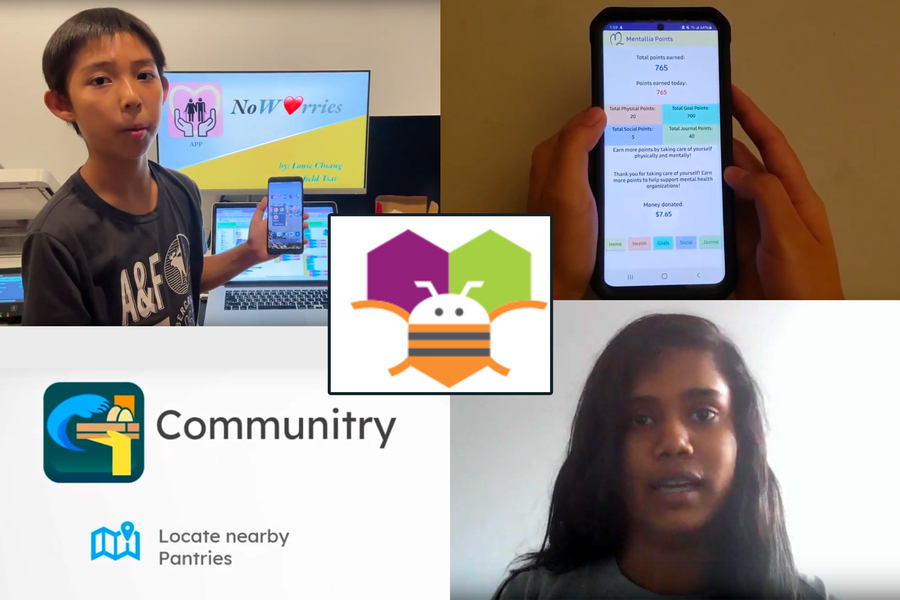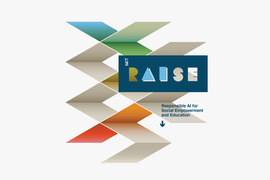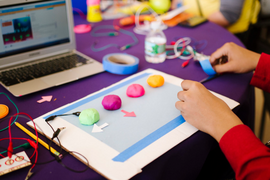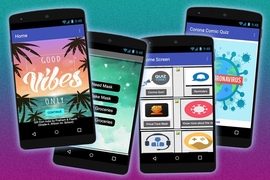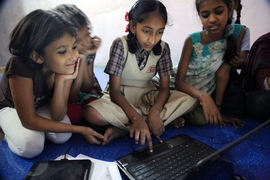How can computer science be used to help make the world a better place? It’s a lofty question, but one that drives the team behind MIT App Inventor, a virtual programming platform that allows budding programmers of all ages to create their own apps.
Following a year of disruption caused by the Covid-19 pandemic, the App Inventor team hosted its second annual virtual Appathon for Good this summer, a marathon-like event during which over 1,000 coders used the App Inventor platform to create apps aimed at helping people in communities around the world. Participants in this year’s Appathon ranged in age from 4 to 82 and hailed from 86 countries.
Hal Abelson, the Class of 1922 Professor in the Department of Electrical Engineering in Computer Science, explains that one of the goals behind the Appathon is to help underscore the importance of impact when it comes to designing new AI systems. Thanks to advances in computer science, he says, it is now possible for high school students to create mobile applications that help people with everything from accessing clean water to urban planning.
“We are blown away by what kids are doing this year and their visions for a better world,” says Abelson. “Kids are now using professional-grade tools to put themselves in the position of drivers of technology.”
From apps created to help improve mental health to food exchange platforms focused on alleviating hunger and systems that help users avoid zombies in a dystopian future, Appathon participants showcased how technology has the power to enable coders to make a significant difference in the world.
Mental health
The impact of lockdowns, school closures, and social isolation on the mental health of kids and teens has been a growing concern during the Covid-19 pandemic. In an effort to help facilitate communication between children and their parents, a U.S.-based team of youths and adults participating in the Appathon for Good developed Vividly, a platform that allows children to share their thoughts and feelings through a virtual intermediary.
“Nowadays technology is so integrated into all of our lives, and children and teens are growing up using technology as a whole other means of expression. This fact can be utilized in improving parent-child communication,” explains Bella Baidak, a 22-year-old graduate student who helped lead the Vividly team as a mentor, which took second place in the mixed youth and adult team category for their efforts.
“Oftentimes teens may feel more comfortable making a social media post about how they feel or texting a friend rather than having a face-to-face conversation with their parents,” Baidak adds. “When it comes to vulnerable topics, technology may be a more comfortable outlet for many teens. Though technology should definitely not be a replacement for face-to-face communication, an app like Vividly could certainly help break the ice.”
Sophia Cho, a 17-year-old student in the U.S., created a platform aimed at helping users maintain and improve their own mental health, based off her own experience using such techniques as meditation, exercise, goal-setting, and journaling. The app, named Mentallia, provides a way for people to track what they are doing to aid their mental well-being, and uses a points system to help motivate participation.
“I love computer science and making useful apps and programs. Many people also deal with a lot of stress daily, so I knew that by making the app I could help other people while also fulfilling one of the themes for the Appathon, which was computational action,” explains Cho.
“I plan on adding a machine learning aspect to Mentallia so that the app can find patterns between certain situations and the user’s emotions and physical symptoms, and give advice on what to do, more or less, to alleviate any distress.”
Inspired by a family friend with dementia, Louie Chiang, an 11-year-old student from Taiwan, developed the NoWorries app, which is focused on improving the quality of life for the elderly. The app features a memory game that users can play with their family photos.
“[When users] play the game, they can see the photos and bring back old memories to make them happy,” says Chiang of the inspiration for the game. He adds that in the future he hopes to “focus on helping elderly people by making more apps that can make their lives easier and happier.”
Hunger
A number of Appathon participants were also motivated to create platforms addressing hunger and facilitating access to food pantries. Communitry, a food exchange platform created by a team of youths and adults from the Philippines, was developed to serve as a hub for food pantries so that people in need can find assistance. The app is also aimed at connecting community organizers looking to establish local food resources. Communitry users can access a map to see established food pantries worldwide and to find directions for pantries near them.
Another app, dubbed Love Parcel, helps users find ways to get donated items to the people who need them. Love Parcel allows people to submit requests for needed items and for charity organizations to help them fulfill the need for specific items, such as food, clothing, or toys.
Cities of the future
Motivated by a desire to improve conditions for pedestrians in Hong Kong, Nathan Lam, a 19-year-old student in Hong Kong whose team worked out of the MIT Hong Kong Innovation Node, and his teammates developed an app that uses live data from busy streets to help traffic lights work better for pedestrians. Lam noted that as red-light running and jaywalking are common in Hong Kong, he and his teammates were inspired to make a meaningful impact on daily life by improving the city’s traffic light system.
“The Appathon presented us with the perfect opportunity to bring our idea to life and improve the community with our app,” Lam and his teammates explain. They add that they plan to implement several changes to their app in the coming months, such as “using a better networking device that supports a 5G connection to reduce the network latency in data transfer, improving intercommunication between traffic lights to increase the efficiency of complicated junctions, and incorporating a priority index to allow emergency vehicles to clear traffic more quickly.”
From traffic lights to visions of the future, some participants created platforms to help people survive in dystopian worlds. From a tracker that could be used to help track and avoid zombies to a platform that explores what life could be like if we live among aliens, and a community monitoring app for residents of the Moon, Appathon participants invented creative solutions to a myriad of futuristic challenges.
Whether or not a zombie tracker is needed in the future, the App Inventor team hopes that providing children and adults with the opportunity to create programs that can make a difference in the world around them will help to empower a whole new generation of computational action.
